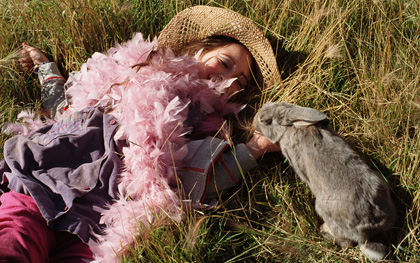Primary navigation

UK/Canada 2005

Reviewed by Mark Sinker
Our synopses give away the plot in full, including surprise twists.
Texas, the present. Eleven-year-old Jeliza-Rose cares for her junkie parents. When her mother ODs, her father, Noah, takes Jeliza-Rose to her grandma's abandoned house and ODs too. Jeliza-Rose, who shapes her world by telling herself stories, explores the house and surrounding cornfields, and attempts to befriend neighbours Dell and Dickens. Dell is sinister and prickly, her brother Dickens a simple-minded, childish adult with a lobotomy scar. Dell mummifies Noah's body. While playing together, Jeliza-Rose and Dickens become very affectionate; he sees himself as a submarine captain and a shark hunter; she discovers he likes explosions and hoards dynamite. When Dell is out, Jeliza-Rose and Dickens go into the bedroom of the latter's mother, where they find a shrine to Dell and Noah as a couple, and the mother's preserved corpse. Dell catches them and becomes angry; the corpse is damaged and Jeliza-Rose flees. That night a huge explosion nearby wrecks Jeliza-Rose's house. Dickens has blown up a train. Amid the wreckage, Jeliza-Rose finds a survivor, a woman who proposes she and Jeliza-Rose take care of one another.
The Bog People are a collection of mummified bodies found preserved in the 1950s after spending millennia in peat graves in Jutland, and famously celebrated in verse by Seamus Heaney, whose 'The Grauballe Man' begins: "As if he had been poured/in tar, he lies/on a pillow of turf/and seems to weep/the black river of himself." Hunched and gnarled, sacrificial victims or executed murderers, the Bog People haunt this extremely odd, intense film. Noah, the junkie-rocker father of 11-year-old heroine Jeliza-Rose, is obsessed with them, and plans to take his family to Jutland for real one day. But "real" is a problem when everyone present is cocooned in fantasy, including Jeliza-Rose, a brisk little child-nurse who wipes daddy's needles and tidies away his drug paraphernalia, and balances these duties with endless storytelling of her undersea adventures - her own version of her father's drug-dream holidays in what he calls "Tideland". And when Noah stiffens into a bog person himself, the woe his daughter must cope with (Heaney's rivers of congealed grief) never once breaks into dialogue or action, but remains unspoken, sublimated into the landscape and the objects littering it.
It's a device - the setting manifesting all the feeling - that defines the Gothic. And those allergic to the Southern Gothic mode of Mitch Cullin's same-name novel, upon which this film is based, may feel that Terry Gilliam's latest movie tries too hard to be weird, controversial or 'cult'. Gilliam appears, gleefully, to have stopped caring about mainstream bankability, and judging by walkouts during preview screenings, many will see Tideland as a ghastly, self-indulgent, unreleasable folly. The director's own shorthand is succinct: "Alice in Wonderland meets Psycho". The Alice element seems straightforward: Jeliza-Rose reads aloud from the book, converses with rabbits and squirrels, and handles the (very peculiar) grown-ups she meets with a grave unflappability. She's at her most childlike when absolutely alone, with a charming squeaky giggle we only hear in long-shot; when she's with her four talking doll-heads, who voice her doubts, fears and pretensions, her fantasies become more soap-operatic.
As for Psycho, Gilliam is referencing the mummy in the basement rather than the slasher in the shower, or rather the mummifier's domestic arrangements, passions and history compacted into that famously silly maquette.
Thus Tideland is the child's-eye view of Jeliza-Rose's own family romance, as she engages with its relics - living, discarded or pickled - and the fairytales she invents to explain it to herself, which crash against what we're seeing. Jodelle Ferland's performance is extraordinary: self-contained, resilient, inventive and joyful. And visually the film is ravishing. Andrew Wyeth's famous painting Christina's World, showing a girl half-prone in a cornfield looking up at a house, the seemingly idyllic scene heavy with loneliness and dread and the corn itself prickly with inanimate hostility, is an acknowledged inspiration.
To what extent does Ferland's performance spring out of or respond to the film's landscape, the Svankmajerish recesses of the abandoned house, the various messy bodies salted into the story? True, when she tells her lobotomised adult acquaintance Dickens that his witch-like sister Dell is her "best friend", it's heartbreaking, given Dell's harsh behaviour towards her. But Janet McTeer's Dell and Brendan Fletcher's Dickens are rendered too cartoonish next to Ferland's guileless directness, so that Jeliza-Rose doesn't seem embedded in any emotional reality outside her own.
To complicate matters, she flirts with a grown-up sexuality that may leave the viewer feeling queasy. Dickens is as terrified of sex as he is of his sister, the romantic tryst self-destructs before Jeliza-Rose imperils herself, and doubtless our queasiness was entirely intended. Nevertheless, there's an alienating distraction here that a novel would sidestep. Instead of the catastrophic household dynamics of this Texas Chainsaw-style set-up being revealed through her young eyes, you may end up worrying about the effects of acting in a story such as this on young Ferland herself.
Still, it was dodging this issue that rendered Terrence Malick's Badlands saccharine and timid. The real-life girlfriend in the Charley Starkweather murder spree portrayed in Malick's film was just 13, but Sissy Spacek, the actress who took on the girlfriend role in the movie, was 24. Somewhere in the unresolved spaces between its best ingredients, Tideland pokes at the bogeys mired deep in any adult recreation of the child mind.
Lewis Carroll unnerves us today far more than Hitchcock, but plenty of viewers won't thank Gilliam for going there.